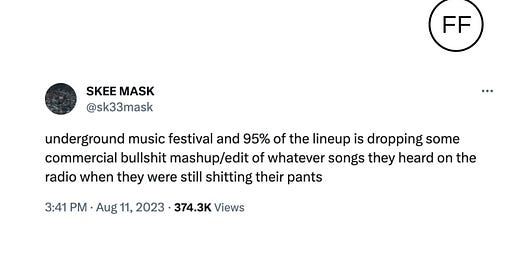The Great Edits Debate Isn't Actually About Edits
a.k.a. The rhetorical battle over dance music goes much deeper than that.
This past Sunday morning, I woke up and saw the following text on my phone:
“Please do a First Floor on all this edits stuff…”
The message came from a DJ and label boss I’ve known for many years, and while they’d never before sent me this sort of request, I wasn’t terribly surprised by the subject they wanted me to tackle. Edits, a catch-all term that’s frequently applied to both mash-ups and bootleg remixes of known (i.e. usually pop) songs, has been THE topic of online conversation during the past week or so, at least within DJ circles, and it seemed to reach a fever pitch when Skee Mask posted the following tweet:
The German producer isn’t someone who’s afraid of going against the dance music grain—back in 2021, I interviewed him after he announced that his Pool LP wouldn’t be appearing on Spotify, and he subsequently pulled his entire catalog from the streaming platform—but his timing here was pretty impeccable. The above tweet came just days after video clips of this year’s Dekmantel—the Amsterdam festival that’s arguably the most prominent large-scale “underground” event in dance music—had flooded social media, many of them depicting crowds going wild to bootleg reworks of Britney Spears, ’90s rap cuts, Y2K-era Eurodance and other chart-pop fare. Even for those of us who weren’t there, the uptick in edits seemed immediately obvious, and Skee Mask wasn’t the first person to express their frustration about it. Just a few days prior, UK bass veteran Sam Binga had tweeted this:
While these tweets from Skee Mask and Sam Binga represent just a fraction of the recent edits “discourse,” they clearly tapped into a wider unrest that’s been brewing throughout the dance music world this year. (My “Being a DJ Is Embarrassing” essay seemed to strike a similar chord when it was published back in June.) At the same time, while their posts quickly prompted a torrent of likes and supportive comments, they also triggered some vehement pushback. Of course the “just let people enjoy things” crowd made themselves heard—as they seemingly do anytime anyone criticizes something popular, no matter how inane it may be—and plenty of people simply dismissed those complaining about edits as old and out of touch. Elsewhere, some members of the pro-edits contingent took a more historical approach, citing the fact that these kinds of tunes have always been part of dance music (which is true), while others took things further, asserting that opposition to pop remixes is not just cultural gatekeeping, but a byproduct of racism, sexism and homophobia.
The rhetoric is running hot on both sides, but who’s actually winning the argument? During this most recent dust-up, the numbers did appear to be in Skee Mask’s favor, but then again, it was only a few months ago that LSDXOXO—a Black, queer artist who was quoted in the latest Crack cover story as saying, “Pop vocals are literally my thing”—got a similarly massive and enthusiastic response to this tweet:
Both sides have their champions, but while it’s tempting to frame the conflict as a battle between two diametrically opposed camps, that would be a gross oversimplification. In the aftermath of his fire-starting tweet, Skee Mask himself posted several clarifications stating that he wasn’t categorically against edits, and as far as I can tell, only the most puritanical of dance music fans would advocate for a wholesale ban on their use. (The most common sentiment expressed during the past week was some version of, “I love a cheeky edit, but…”) Thanks to the Twitter algorithm—which is not only designed to incentivize conflict, but also routinely rewards those who mischaracterize / oversimplify others’ arguments—that kind of nuance tends to get lost online, as does the fact that the complaints voiced by Skee Mask (and those who share his perspective) are rooted in something that goes a lot deeper than a silly mash-up or two.
Edits might be the focus of the current conversation, but what most critical voices are upset about—whether they realize it or not—is what they perceive as the cheapening and commercialization of dance music, and what that means for the culture moving forward.






